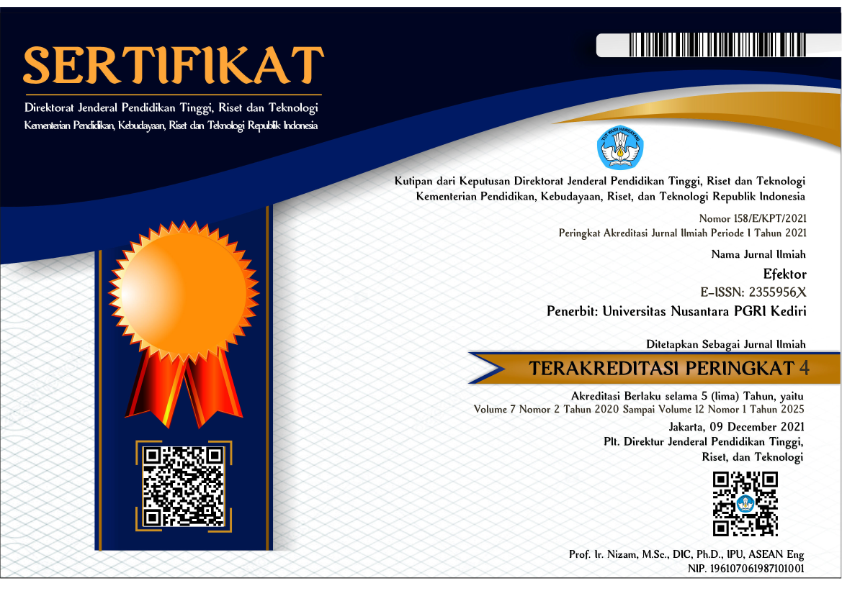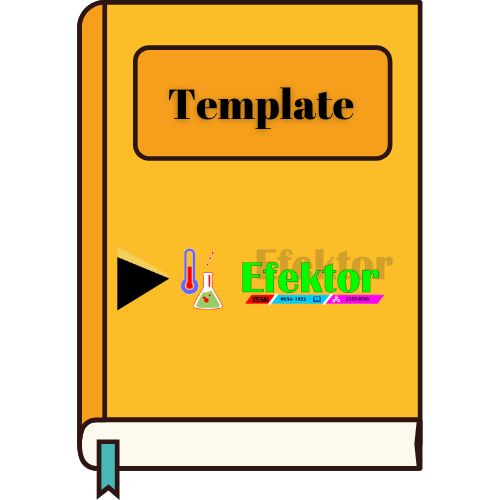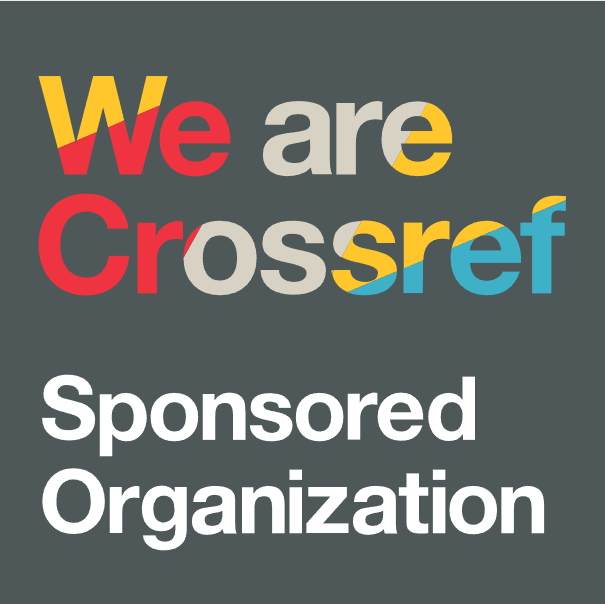STEAM Based Learning Strategies By Playing Loose Parts For the Achievement of 4c Skills in Children 4-5 Years
DOI:
https://doi.org/10.29407/e.v7i1.14387Keywords:
STEAM learning, media loose parts, children aged 4-5 yearsAbstract
Learning problems in producing students who have 4c competence (creativity, communication, collaboration, critical thinking) are still very limited, especially in PAUD. The problem can be seen from the achievements of children's development were limited creativity when teaching learning process occurs, children have low communication skills and express opinions from the results of groups or collaborations. This is due to the role of the teacher is still dominant in teaching learning process and teacher limits the children's creativity by providing less varied of learning media because it only uses student worksheets that are available at school. STEAM-based learning (Science, Technology, Engineering, Art, Mathematic) with loose parts media was chosen because it is in line with 21st century education where critical thinking skills, creative, collaborative and communicative are honed by playing. Based on the results of observation showed that learning activities implemented by teacher in Group A Pertiwi 2 Bodor Kindergarten did not lead to 21st century learning yet so that learning activities were monotonous and the teacher was not be able to direct students to master the 4c skills. From these problems, the teacher applied STEAM-based learning by using Loose Parts media. The research method used descriptive qualitative with 13 subjects of Group A aged 4-5 years old at TK Pertiwi 2 Bodor. Data collection was done by observation and documentation techniques, then it was analyzed qualitatively that is analyzing the child's developmental achievements objectively. The results showed that STEAM-based learning using loose parts media effectively was increased the ability of 4c children aged 4-5 years, so it is recommended that this learning can be implemented continuously to see the students’ achievement in other aspects.
References
Artobatama. I. (2018). Pembelajaran Stem Berbasis Outbound Permainan Tradisional. Indonesian Journal of Primary Education, Vol.2, No.2 (2018) 40-47 ISSN: 2597-4866.
Casey, Theresea & Juliet Robertson. 2016. Loose Parts Play. Inspiring Scotland.
Jarvis; M. (2009). Teori-Teori Psikologi; Bandung: Nusa Media.
Kurniasih, I. (2009). Pendidikan Anak Usia Dini. Jakarta: Edukasia.
Kim., H., & Chae., D.H. (2016). The Development and Application of a STEAM ProgramBased on Tradisional Korean Culture. Eurasia Journal of Mathematics & Science & Technologi Education, 2016, 12 (7), 1925-1936.
Munawar., M., Roshayanti. F.,& Sugiyanti. (2019). Implementation Of STEAM (Science Technology Enggineering Art Mathematics)- Based Early Childhood Education Learning In Semarang City. Jurnal Ceria; ISSN: 2614-6347, Vol. 2, No.5. September 2019.
Munawar, Muniroh dkk. 2019. Implementation Of STEAM (Science Technology Engineering Art Mathematics)-Based Early Childhood Education Learning In Semarang City. Jurnal Ceria. Vol. 2 No. 5: 277-278
Permanasari, A. (2016). STEM Education: Inovasi dalam pembelajaran Sains. Prosiding Seminar Nasional Pendidikan Sains. Peningkatan Kualitas Pembelajaran Sains Dan Kompetensi Guru Melalui Penelitian & Pengembangan Dalam menghadapai Tantangan Abad -21, Surakarta, 22 Oktober 2016.
Purnamasari. Nia. I.(2019). Komparasi Konsep Sosiokulturalisme Dalam Pendidikan: Perspektif Barat dan Islam. EL-BANAT: Jurnal Pemikiran dan Pendidikan Islam, Volume 9, No.2 (2019)
Pamungkas. B. (2020). Pembelajaran Abad 21. www.tripven.com/pembelajaran-abad-21/ (diakses tanggal 10 Mei 2020)
Redhana, I. W. ( 2019). Mengembangkan Keterampilan Abad Ke-21 Dalam Pembelajaran Kimia. Jurnal Inovasi pendidikan Kimia, Vol.13, No.1; 2019; 2239-2253
Siantajani,Y. 2020. Loose Parts. Material Lepasan Otentik Stimulasi PAUD. Semarang; PT sarang Seratus Aksara.
Sadiah. N.H., & Lestari., R.H. (2020).Upaya Meningkatkan Pengetahuan Sains Pada Anak usia Dini Melalui Pembelajaran STEAM. Jurnal Ceria (Cerdas Energik Responsif Inovatif Adaptif) ISSN: 2614-6347, Vol.3. No.3. Mei 2020.
Wahyuningsih, Siti dkk. 2020. Efek Metode STEAM Pada Kreatifitas Anak Usia 5-6 Tahun. Jurnal Obsesi :Jurnal Pendidikan Anak Usia Dini. Vol. 4: 295-301
Yakman, G., & Lee,H. (2012). Exploring The Exemplary STEAM Education In The U.S as a practical educational framework for Korea. Journal of The Korean Association for Scence Education, 32(6), 1072-1086.
Downloads
Published
Issue
Section
License
Authors who publish with this journal agree to the following terms:
- Copyright on any article is retained by the author(s).
- The author grants the journal, the right of first publication with the work simultaneously licensed under a Creative Commons Attribution License that allows others to share the work with an acknowledgment of the work’s authorship and initial publication in this journal.
- Authors are able to enter into separate, additional contractual arrangements for the non-exclusive distribution of the journal’s published version of the work (e.g., post it to an institutional repository or publish it in a book), with an acknowledgment of its initial publication in this journal.
- Authors are permitted and encouraged to post their work online (e.g., in institutional repositories or on their website) prior to and during the submission process, as it can lead to productive exchanges, as well as earlier and greater citation of published work.
- The article and any associated published material is distributed under the Creative Commons Attribution-ShareAlike 4.0 International License













